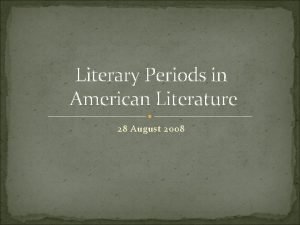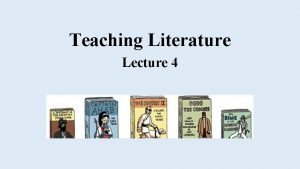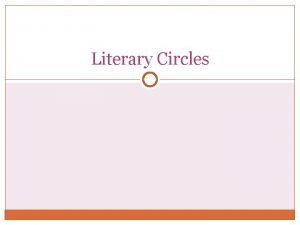Teaching the American Literary Tradition American Literature of


















- Slides: 18

Teaching the American Literary Tradition American Literature of the 1920 s Michael Soto Associate Vice President for Academic Affairs and Professor of English July 8, 2020

“The Negro Speaks of Rivers” Crisis magazine (June 1921)

TEKS and Literary Analysis • • • traditional, contemporary, classical, and diverse texts use of text structure to achieve the author’s purpose stanzas, line breaks, speaker, and sound devices in poems – – Why five stanzas? Ten lines? Organizing principles? Why are lines/sentences coterminous? What happens when we change key words with near matches (“known, ” “soul”)? Who is “I”? speaker/tone/performance

Morgan Freeman will be their answer so be prepared to tell them why they’re right.

“Rivers” as 1920 s poem • • transnational, transhistorical subject as U. S. civil rights document Red Summer (1919): Red Scare + returning soldiers + racial terrorism NAACP nationalizes civil rights cause Harlem Renaissance (or “Negro Renaissance”)

Lynchings during Hughes’s youth (1902 -1921) https: //plaintalkhistory. com/monroeandflorencework/

The Harlem Renaissance From “Old Negro” Stereotype to “New Negro” Innovation James Van Der Zee, Couple, Harlem (1932) Library of Congress

Residential Segregation in NYC (1930) Percent Negro by Census Tract

The Birth of a Poem “The Negro Speaks of Rivers” www. txtransportationmuseum. org

Langston Hughes in Mexico City Apartment near the Zócalo (public square in city center) Photo by Michael Soto (2019)

International and Great Northern Railroad Today: VIA Multimodal Transit Center www. txtransportationmuseum. org

The Negro Speaks of Rivers I’ve known rivers: I’ve known rivers ancient as the world and older than the flow of human blood in human veins. My soul has grown deep like the rivers. I bathed in the Euphrates when dawns were young. I built my hut near the Congo and it lulled me to sleep. I looked upon the Nile and raised the pyramids above it. I heard the singing of the Mississippi when Abe Lincoln went down to New Orleans, and I’ve seen its muddy bosom turn all golden in the sunset. I’ve known rivers: Ancient, dusky rivers. My soul has grown deep like the rivers.



Hughes in Spain Hughes, Michael Koltyov, Ernest Hemingway, Nicolas Guillen Yale University Beinecke Library

Borges and Sur Adolfo Bioy Casares, Victoria Ocampo, and Jorge Luis Borges (1934) El País

Jorge Luís Borges translates Hughes Sur magazine (1931)

Langston Hughes, gaucho poet in the hands of Jorge Luis Borges ● darker brother → hermano oscuro ● grow strong → me pongo fuerte ● Nobody ’ll dare → Nadie se animará ● “Eat in the kitchen” → “Vete a la cocina” ● ellipses ● America → América ● Whitman → Hernández Aquí me pongo á cantar Al compás de la vigüela. . .
 What are literary traditions
What are literary traditions Literary eras
Literary eras Difference between microteaching and traditional teaching
Difference between microteaching and traditional teaching Aims of teaching literature
Aims of teaching literature Language based approach
Language based approach Hát kết hợp bộ gõ cơ thể
Hát kết hợp bộ gõ cơ thể Lp html
Lp html Bổ thể
Bổ thể Tỉ lệ cơ thể trẻ em
Tỉ lệ cơ thể trẻ em Chó sói
Chó sói Glasgow thang điểm
Glasgow thang điểm Hát lên người ơi alleluia
Hát lên người ơi alleluia Các môn thể thao bắt đầu bằng tiếng đua
Các môn thể thao bắt đầu bằng tiếng đua Thế nào là hệ số cao nhất
Thế nào là hệ số cao nhất Các châu lục và đại dương trên thế giới
Các châu lục và đại dương trên thế giới Cong thức tính động năng
Cong thức tính động năng Trời xanh đây là của chúng ta thể thơ
Trời xanh đây là của chúng ta thể thơ Mật thư tọa độ 5x5
Mật thư tọa độ 5x5 Làm thế nào để 102-1=99
Làm thế nào để 102-1=99



































